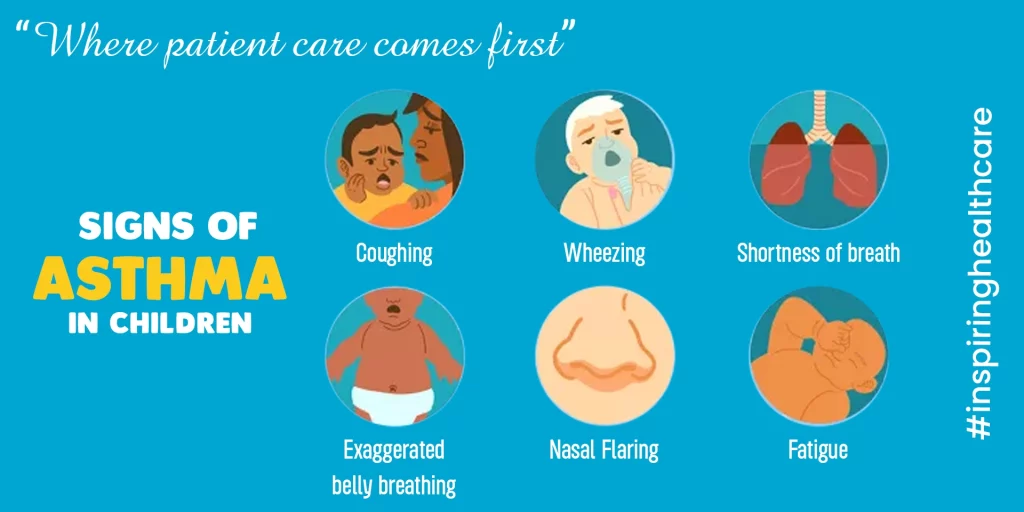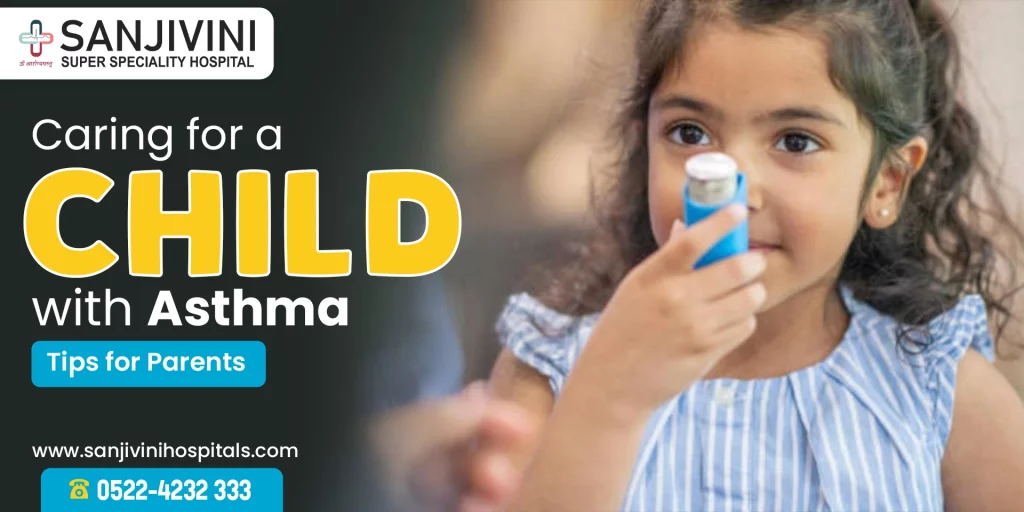Medically Reviewed by: Dr. Sonali Pandey– DCH, MBBS, DNB Paediatrics
Having a child with asthma can be overwhelming for parents. Asthma is a common condition that affects the lungs, making it hard for kids to breathe at times. But with the right knowledge and support, parents can help their child manage asthma effectively. In this blog, we’ll explore simple yet essential tips for parents to care for a child with asthma. From understanding what asthma is and how it’s treated, to creating an asthma action plan and managing triggers, we’ll cover everything you need to know to keep your child healthy and happy. So, let’s dive in and learn how to support your child with asthma every step of the way.
Understanding Asthma
- Definition and Causes of Asthma:
- Asthma is a chronic lung disease marked by airway inflammation and narrowing, leading to breathing difficulties, coughing, wheezing, and chest tightness.
- Its exact cause is not fully understood but is believed to result from a combination of genetic factors and environmental triggers like allergies, respiratory infections, air pollution, and exposure to tobacco smoke.
- Common Symptoms in Children:
- Asthma symptoms in children vary and may include nighttime or early morning coughing, audible wheezing during breathing, shortness of breath during physical activity, chest tightness, fatigue, dark circles under the eyes, irritability, and feeding difficulties in infants.
- Triggers for Asthma Attacks:
- Various factors can trigger asthma attacks in children, including indoor and outdoor air pollutants, allergens such as dust mites, pet dander, pollen, or mold, cold and dry air, physical exertion, and respiratory infections.
- Triggers can vary among children, and symptoms may not manifest immediately, often appearing hours after exposure.
- Identifying and avoiding specific triggers can help reduce the risk of asthma exacerbations.
Also Read: Neonatal Jaundice: Causes, Symptoms, and Treatment
Risk factors and symptoms
Risk Factors: Several factors may increase a child’s risk of developing asthma:
- Family history of asthma or allergies.
- Previous allergic reactions, such as skin reactions, food allergies, or hay fever.
- Living in areas with high pollution levels.
- Exposure to secondhand smoke during pregnancy or early childhood.
- Respiratory conditions like chronic runny or stuffy nose, inflamed sinuses, or pneumonia.
- Being male.
- Being Black or Puerto Rican.
- Obesity.

Symptoms: Recognizing the symptoms of asthma in children is crucial:
- Coughing, especially at night or early morning.
- Breathing difficulties, such as shortness of breath, rapid breathing, or gasping for air.
- Fatigue.
- Dark circles under the eyes.
- Irritability.
- Wheezing, producing a whistling sound when breathing out.
Symptoms can vary in severity and frequency. During asthma attacks, symptoms worsen, with warning signs including severe coughing, significant breathing difficulties, and a bluish discoloration of the face, lips, and/or fingernails.
It’s crucial to understand that asthma symptoms differ from child to child and may change over time. While asthma cannot be cured, proper treatment can control symptoms and prevent lung damage in growing children.
If you notice these symptoms in your child, it’s vital to seek medical assistance promptly for accurate diagnosis and effective asthma management.
Reducing Asthma Attacks in Children: Tips for Parents
- Identify and Avoid Triggers:
- Work with your child’s healthcare provider to identify triggers such as allergens (e.g., dust mites, pet dander, pollen), irritants (e.g., smoke, strong odors), and environmental factors (e.g., cold air, pollution).
- Take steps to minimize exposure to known triggers at home, school, and other environments where your child spends time.
- Create a Clean and Healthy Home Environment:
- Keep your home clean and well-ventilated to reduce indoor allergens and irritants.
- Use allergen-proof covers on pillows and mattresses, and wash bedding regularly in hot water.
- Vacuum carpets and rugs frequently use a vacuum cleaner with a HEPA filter.
- Avoid smoking inside the house and discourage smoking around your child.
- Follow the Asthma Action Plan:
- Work with your child’s healthcare provider to develop a personalized asthma action plan.
- Ensure that all caregivers, including teachers and family members, are familiar with the plan and know how to respond in case of an asthma emergency.
- Monitor your child’s symptoms regularly and adjust the plan as needed.
- Encourage Regular Medication Use:
- Ensure that your child takes their asthma medications as prescribed by their healthcare provider.
- Teach your child how to use their inhaler or nebulizer correctly and supervise them until they can do it independently.
- Keep track of medication refills and schedule regular follow-up appointments with the healthcare provider.
- Promote a Healthy Lifestyle:
- Encourage regular physical activity to strengthen your child’s lungs and overall health.
- Provide a balanced diet rich in fruits, vegetables, and whole grains, and limit foods that may trigger asthma symptoms (e.g., Processed food, Fish, Peanuts, cow’s milk, etc).
- Ensure your child gets enough sleep and practices good sleep hygiene.
- Stay Informed and Prepared:
- Educate yourself about asthma and stay updated on the latest treatment options and guidelines.
- Be prepared for asthma emergencies by knowing when to seek medical help and having emergency contacts readily available.
- Consider taking a first aid/CPR course to be better prepared to handle asthma emergencies.
- Foster Open Communication:
- Encourage your child to communicate openly about their asthma symptoms and concerns.
- Listen to your child’s needs and address any fears or anxieties they may have about their condition.
- Create a supportive and understanding environment where your child feels comfortable discussing their asthma management.
Also Read: Nutrition Tips for Picky Eaters: A Guide for Parents
By implementing these strategies and working closely with your child’s healthcare provider, you can help reduce the frequency and severity of asthma attacks in your child, enabling them to lead a healthier and happier life.
In case you encounter any critical issues with your child’s asthma, it’s imperative to seek prompt medical assistance. Sanjivini Super Specialty Hospital in Lucknow provides specialized care and expertise in managing respiratory conditions like asthma.

